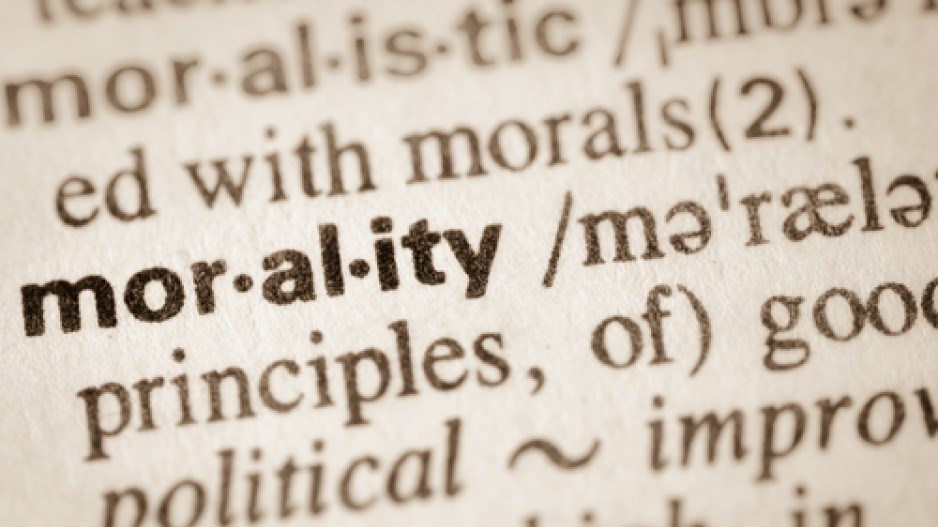During the course of my career as a public opinion researcher, I have asked about topics that would be expected to garner unanimous backing. Still, it is impossible to say that all Canadians feel the same way about an issue. There are always dissenters, even on feeling “upset” after the riots that followed the last Stanley Cup final that featured the Vancouver Canucks.
When people ponder moral issues, the fluctuations are always fascinating. I have had a few chances to ask Canadians about this, relying on a modified questionnaire initially used in the United States by the venerable Gallup firm. This year, at Research Co., along with the usual Canadian cross-tabulations for age, gender and region, we chose to add another layer of analysis – ethnicity.
There are three moral issues where the age differences are striking. We found that majorities of Canadians aged 18 to 34 (54%) and aged 35 to 54 (59%) believe physician-assisted death is morally acceptable. Among Canadians aged 55 and over, the proportion jumps to 71%.
Canadians are divided on the death penalty, with 40% finding it morally acceptable and 37% saying it is morally wrong. However, the proportion of respondents who have no moral qualms with sentencing a person to death increases with age: 34% for those aged 18 to 34, 39% for those aged 35 to 54 and 45% for those aged 55 and over.
Canadians aged 18 to 34 – a generation that grew up with unbridled web access and “sext-ing” – are more likely to find pornography morally acceptable (48%) than those aged 35 to 54 (38%) and those aged 55 and over (24%).
There is a sizable gender gap when Canadians are asked about animals. Men are more likely than women to believe that three issues are morally acceptable: buying and wearing clothing made of animal fur (men 41%, women 24%), medical testing on animals (men 31%, women 14%) and cloning animals (men 26%, women 13%).
Conversely, 45% of men have no moral misgivings about pornography or prostitution, but the proportion of women who share these views is considerably smaller (28% and 21%, respectively).
On a regional basis, British Columbia is home to the smallest proportion of Canadians who think buying and wearing clothing made out of fur and medical testing on animals are morally acceptable. B.C. residents are also the most likely to have no moral qualms about gambling or prostitution.
Quebec’s results on human relationships are perplexing. The province has the highest proportion of residents who think married men and/or women having an affair is morally acceptable (21%, compared with the Canadian average of 14%) and the lowest number of residents who believe divorce is morally acceptable (66%, compared with the Canadian average of 71%).
Speaking of divorce, Canadians who voted for the Conservative Party of Canada in 2019 are less likely to find the practice morally acceptable (65%) than those who cast ballots for the Liberal Party of Canada (76%) or the New Democratic Party (79%).
The political divide is more evident on three other issues. While majorities of New Democrats (74%) and Liberals (67%) have no moral qualms about sexual relations between two people of the same sex, only 49% of Conservatives concur. A similar scenario is observed on abortion. Sizable proportions of New Democrats (68%) and Liberals (61%) deem the procedure morally acceptable, compared with just 45% of Conservatives.
The political numbers shift on the death penalty. Most Conservatives (53%) believe taking the life of a convicted criminal is morally acceptable, compared with just over one-third of Liberals and New Democrats (36% each).
Finally, ethnicity may also play a factor in determining views. For instance, while about one in four residents of European descent has no moral qualms about using illegal drugs (23%), the proportion drops to 12% among those of South Asian origin and 11% among those of East Asian origin.
Canadians of South Asian descent appear particularly troubled by two dilemmas. Only 41% of them believe sexual relations between two people of the same sex are morally acceptable, compared with 52% for East Asian Canadians and 69% for European Canadians. An even smaller proportion of South Asian Canadians (34%) have no problems with a woman having a baby outside of marriage – an issue that majorities of East Asian (52%) and European Canadians (76%) express no reservations about.
The concept of a mosaic is alive and well in Canada when it comes to morality. A person’s gender, age, political allegiance and upbringing can determine which issues are more likely to be abhorred. •
Mario Canseco is president of Research Co.
Results are based on an online study conducted January 6–9, 2020, among 1,000 adults in Canada. The data has been statistically weighted according to Canadian census figures for age, gender and region in Canada. The margin of error, which measures sample variability, is plus or minus 3.1 percentage points, 19 times out of 20.




